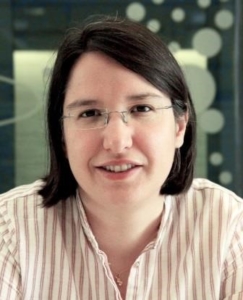Simulating unconventional superfluids with multicomponent Bose-Einstein condensates
Leticia Tarruell (ICFO)
ABSTRACT:
Unconventional superfluids, where frictionless flow appears combined with features such as liquid behaviour, topological excitations, or crystalline order, are some of the most surprising collective quantum phases of matter. Although such states were originally predicted in the condensed matter context, ultracold quantum gases provide a more controlled experimental approach to their study, and promise microscopic access to their exotic properties in a quantum simulation approach. A key mechanism towards unconventional superfluidity is the competition in the same system of interactions of different origins, a situation naturally addressed by multicomponent gases. In my lecture, I will introduce this field of research and discuss some of the possibilities that mixtures of Bose-Einstein condensates open for exploring novel unconventional superfluids, focusing on two examples: the observation of ultradilute quantum liquid droplets, and the realization of chiral condensates where interatomic interactions change their value depending on the centre of mass momentum of the overall system.
RECOMMENDED PAPERS:
C.R. Cabrera et al., Science 359, 301 (2018)
BIO:
 Leticia Tarruell studied physics in Madrid and Paris. She obtained her PhD in 2008, with a thesis on fermionic superfluidity at Ecole Normale Supérieure Paris under the supervision of C. Salomon. As a postdoc, she studied Fermi gases in optical lattices in the group of T. Esslinger at ETH Zurich. After working as Chargée de Recherche CNRS at Institut d’Optique in Bordeaux (group of P. Bouyer), she joined ICFO as Group Leader in 2013. The Ultracold Quantum Gases group that she has established there performs quantum simulation experiments with mixtures of potassium Bose-Einstein condensates and ultracold strontium gases. She was awarded a young investigator prize of the Spanish Royal Physics Society in 2015, a Ramón y Cajal fellowship in 2016, and an ERC Consolidator Grant in 2020.
Leticia Tarruell studied physics in Madrid and Paris. She obtained her PhD in 2008, with a thesis on fermionic superfluidity at Ecole Normale Supérieure Paris under the supervision of C. Salomon. As a postdoc, she studied Fermi gases in optical lattices in the group of T. Esslinger at ETH Zurich. After working as Chargée de Recherche CNRS at Institut d’Optique in Bordeaux (group of P. Bouyer), she joined ICFO as Group Leader in 2013. The Ultracold Quantum Gases group that she has established there performs quantum simulation experiments with mixtures of potassium Bose-Einstein condensates and ultracold strontium gases. She was awarded a young investigator prize of the Spanish Royal Physics Society in 2015, a Ramón y Cajal fellowship in 2016, and an ERC Consolidator Grant in 2020.
